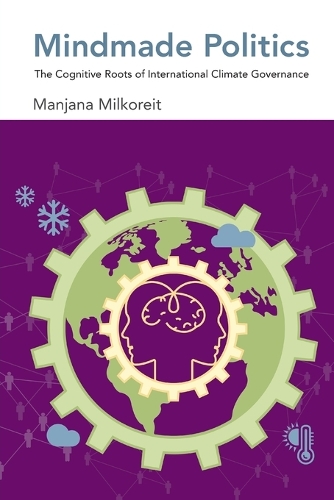
Mindmade Politics: The Cognitive Roots of International Climate Governance
(Paperback)
Available Formats
Publishing Details
Mindmade Politics: The Cognitive Roots of International Climate Governance
By (Author) Manjana Milkoreit
MIT Press Ltd
MIT Press
6th February 2024
United States
Classifications
Professional and Scholarly
Non Fiction
Environmental policy and protocols
363.73874561
Physical Properties
Paperback
352
Width 152mm, Height 229mm
369g
Description
Mindmade Politics takes a novel, interdisciplinary approach to understanding the complex and contentious dynamics of global climate politics. Manjana Milkoreit argues that integrating cognitive theories and international relations scholarship can yield valuable insights into multilateral cooperation (or the lack of it) on climate change and the process of negotiating climate agreements. Milkoreit argues that cognition is at the root of all political behavior and decision making. Some of the most important variables of international relations scholarship-the motivations of political actors-are essentially cognitive variables. Drawing on interviews with participants in the United Nations Framework Convention on Climate Change (UNFCCC), Milkoreit examines the thoughts, beliefs, and emotions of individuals and groups, focusing on the mental mechanisms connecting decision-relevant factors and observed political behavior. Milkoreit offers a brief introduction to international relations theory and key insights regarding the politics of climate change; outlines the basic cognitive theories and concepts that she applies in her analysis, discussing the cognitive challenges of climate change; and describes the integrated methodological approach she used for her cognitive-political analysis. She presents four cognitive-affective lessons for global change politics, including the "cognitive triangle" of three major concerns of climate negotiators-threat, identity, and justice-and she identifies six major belief systems driving negotiators. Finally, she offers guidance for climate governance based on her findings. Utilizing recent advances in cognitive science, Milkoreit builds a theoretical bridge between two major disciplines that will benefit both scholars and practitioners. How integrating cognitive theories and international relations scholarship can yield valuable insights into the effectiveness of climate negotiations. Mindmade Politics takes a novel, interdisciplinary approach to understanding the complex and contentious dynamics of global climate politics. Manjana Milkoreit argues that integrating cognitive theories and international relations scholarship can yield valuable insights into multilateral cooperation (or the lack of it) on climate change and the process of negotiating climate agreements. Milkoreit argues that cognition is at the root of all political behavior and decision making. Some of the most important variables of international relations scholarship-the motivations of political actors-are essentially cognitive variables. Drawing on interviews with participants in the United Nations Framework Convention on Climate Change (UNFCCC), Milkoreit examines the thoughts, beliefs, and emotions of individuals and groups, focusing on the mental mechanisms connecting decision-relevant factors and observed political behavior. Milkoreit offers a brief introduction to international relations theory and key insights regarding the politics of climate change; outlines the basic cognitive theories and concepts that she applies in her analysis, discussing the cognitive challenges of climate change; and describes the integrated methodological approach she used for her cognitive-political analysis. She presents four cognitive-affective lessons for global change politics, including the "cognitive triangle" of three major concerns of climate negotiators-threat, identity, and justice-and she identifies six major belief systems driving negotiators. Finally, she offers guidance for climate governance based on her findings. Utilizing recent advances in cognitive science, Milkoreit builds a theoretical bridge between two major disciplines that will benefit both scholars and practitioners.
Author Bio
Manjana Milkoreit is Assistant Professor of Public Policy in the Department of Political Science at Purdue University.
